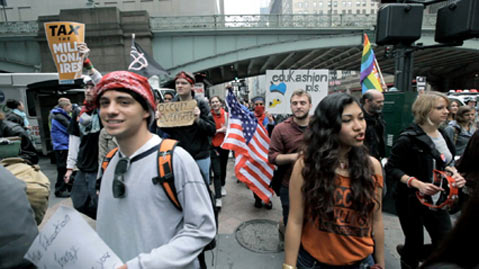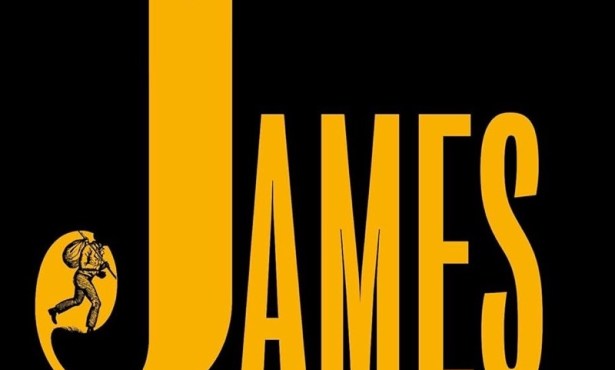Occupy the Movie
Director Corey Ogilve

There’s been no shortage of journalism related to 2011’s Occupy Wall Street movement, with films, articles, television specials, and, of course, news reports, all working to various degrees to try and explain the larger meaning of the people powered mini-revolt of little more than a year ago.
However, in the feature-length documentary Occupy the Movie, Canadian filmmaker Corey Ogilvie manages to succeed where so many before him have failed. By focusing on both the actual underpinnings of the original protest and documenting the subsequent months through the vantage point and voices of many of the actual organizers, Ogilvie is able to contextualize the movement in a way that celebrates it while also reflecting its biggest flaws.
Prior to making this film, what was your connection to Occupy?
I have always related to Occupy as a filmmaker, not an activist. Yet they did inspire me, like many others around the world, with their bold actions in New York in 2011. I remember on October 15 going to an Occupy protest here in Vancouver and seeing friends there I never thought I’d see at a protest. It woke people up, and in many ways, woke me up as a filmmaker. Also, I studied social movements as an undergrad majoring on Sociology at UBC, so these studies helped me navigate what is a very tricky social movement to grasp.
What do you think is the biggest public misconception about Occupy?
Occupiers are workaholics, obsessed with results — not lazy college grads wanting hand-outs. When they had a park to maintain, it literally absorbed all of their energy. Now without a park and out of the national spotlight, they are working on the local level.
We see a lot of work being done on food co-ops, student debt, housing, Hurricane Sandy relief. Sure CNN and ABC won’t cover it, but it is happening more now than the early days. Also, Occupiers are moderate and humble — not combative radicals wanting full scale revolution. I was very surprised at how self-critical they were in the interviews, always taking time to point out their mistakes and weaknesses. This actually made my editing job very easy, they were their own critics in the film. Also, many said they want to buy into the American dream, but it is nearly worthless right now given the economic damage caused by Wall Street.
What makes this movie different from all the other journalism about Occupy?
Unlike most other Occupy journalism, our film is in-depth. It looks at the workings of Occupy as a social movement, warts and all — its strengths, weaknesses, successes, failures, structure, leaders, followers, causes, etc. I’ve seen some investigative news programs about Occupy, but they were all very descriptive and formulaic. And for other films, we’ve only heard of a handful, and none took the social movement as their central subject as far as I could see.
In many ways this film puts you in the drivers seat of a social movement, where you’ll see all the behind the scenes drama that makes it tick: near-death experiences, nervous breakdowns, infighting, mutiny, betrayal, infiltrations, wire-tapping…all aspects of Occupy not many people have seen in the media.
One of the strengths of the film, in my opinion, was your ability to so clearly break down the economic underpinnings of the motivation behind Occupy. Talk a bit about that process and why it was so important to you.
Context defines social movements. If you don’t have corrupt banks, you won’t have Occupy Wall Street. This is why we dedicated half the film to looking at the economics that surround Occupy. I had one private critique of the film say, “You should take out the Federal Reserve section, it has nothing to do with Occupy.” My response was, “The Fed is the bank of banks, to not understand the Fed is to not understand Occupy.”
I think if we look around right now, the context has been getting worse in many ways. We have Barclays’ LIBOR scandal, HSBC drug money laundering, JP Morgan’s $2 billion error, and the list goes on and on. Thankfully none of these scandals caused another recession, but many argue it is a matter of time, pointing to 2008 as their example.
What, if anything, surprised you during the making of this film? What do you see as the movements greatest victory and biggest defeat?
I was most surprised by how self-critical they were. I think a lot of Occupy’s strength comes from their processes of self-reflection — the general assembly is an example of this, where everyone gets equal input.
However, their greatest weakness seems to be a group orthodoxy that repels newcomers. We saw a lot of exclusion, infighting, and cliques, and this is discussed in the film. I guess as an outsider you hope a protest group can overcome these human group dynamics for the greater purpose, only to find out they cannot. So I think their biggest defeat will be if they cannot engage the majority of people like they did in 2011.
From where you sit, what is the current state of the Occupy movement?
Currently, Occupy is a model of how to relate to each other in a group setting to get something done. It has no park or physical space, but rather it is a social space people can enter, and leave, at their own will. I am very encouraged to see Occupy applying this model to doing humanitarian work at Hurricane Sandy, as well as many home foreclosure defenses. This is Occupy’s greatest strength: No one owns it, or rather, anyone can own it, they just have to show up and be part of it.
Occupy the Movie screens on Fri., Jan. 25, 1 p.m., at the Museum of Art and on Sat., Jan. 26, 10 p.m., at the Metro 4. See occupythemovie.com .



